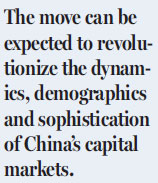Since 2013, when MSCI, a United States-based provider of equity, fixed income, hedge fund stock market indexes, announced that it would consider the inclusion of China A-shares into its MSCI Emerging Market Index, China's equities market has undergone significant change. For example, the Shanghai-Hong Kong Stock Connect and Shenzhen-Hong Kong Stock Connect, launched in 2014 and 2016 respectively, provide overseas investors with access to more than 75 percent of China A-shares in terms of market capitalization.
In March 2017, the MSCI reopened its annual consultation on A-share inclusion. An affirmative outcome would not only be a major milestone for China's capital markets but also provide unprecedented benefits for global and onshore investors.
In June 2016, when the MSCI announced it would not include China A-shares, it made the following recommendations:
The removal of the 20 percent monthly Qualified Foreign Institutional Investor repatriation limit; the introduction of new trading suspension procedures; and the removal of restrictions on products linked to indexes that include China A-shares.
The revised March proposal introduced new criteria reducing the number of securities to be included from 448 to 169.
They include only large-cap companies accessible through the Shanghai and Shenzhen Stock Connect programs; exclusion of A-shares that have H-Share listings included in the MSCI China Index; exclusion of Index constituents that have been suspended for more than 50 days; exclusion of securities that have been suspended for more than 50 days in the past 12 months; and no fast-track inclusion of initial public offerings.
UBS strategist Gao Ting is optimistic about the possibility of A-share inclusion this year, because of the new proposal's potential to dispel investor concerns over liquidity and capital mobility. While pre-approval requirements for A-share linked financial products remain, a solution is being sought.

The Shanghai and Shenzhen stock exchanges together would be the world's second-largest in terms of both market capitalization and trading value.
The inclusion of Chinese securities in a globally diversified portfolio is "a must" for any investor seeking truly global asset allocation. However, the 30-day correlation between the MSCI China Index and the Shanghai Composite Index is close to zero - the lowest correlation of the two indexes since 2006 - begging the question: Is the MSCI China Index still representative of the onshore China markets?
The sector composition of the MSCI China Index, which is skewed toward financials and information technology which account for 60 percent of the index's market capitalization, is vastly different from China's onshore markets. However, financials and information technology represent less than 30 percent of China's onshore market capitalization. On the other hand, industrials and materials account for less than 10 percent of the MSCI China Index, but are one-third of China's onshore market capitalization.
While inclusion of China A-shares will not immediately correct the dislocation, it will enhance the representation of China's onshore markets in global investor portfolios.
UBS estimates passive inflow resulting from the addition of 169 China A-shares to be $1.49 billion assuming a 5 percent partial inclusion factor. And, if active funds reallocate positions in line with the benchmark weight adjustments, another $8.1 billion inflow could emerge over the short term. The figure would increase to $27.61 billion if the stocks were included at 100 percent of their original weighting. About 64 percent of the free-float market capitalization would be listed in Shanghai, with the balance in Shenzhen.
The inclusion of China A-shares into the MSCI China Index is synonymous with the country's accession to the World Trade Organization in 2001. In the following decade, China's economy was boosted by both foreign direct investment and the increased sophistication in domestic industries that came with foreign participation.
The inclusion of A-shares in the MSCI will attract foreign institutional investors, who will bring with them new philosophies and valuation methods. The move can be expected to revolutionize the dynamics, demographics and sophistication of China's capital markets.
Tommie Fang is head of China Equities at UBS, and Ian Loh is an analyst of structured solutions at UBS.
